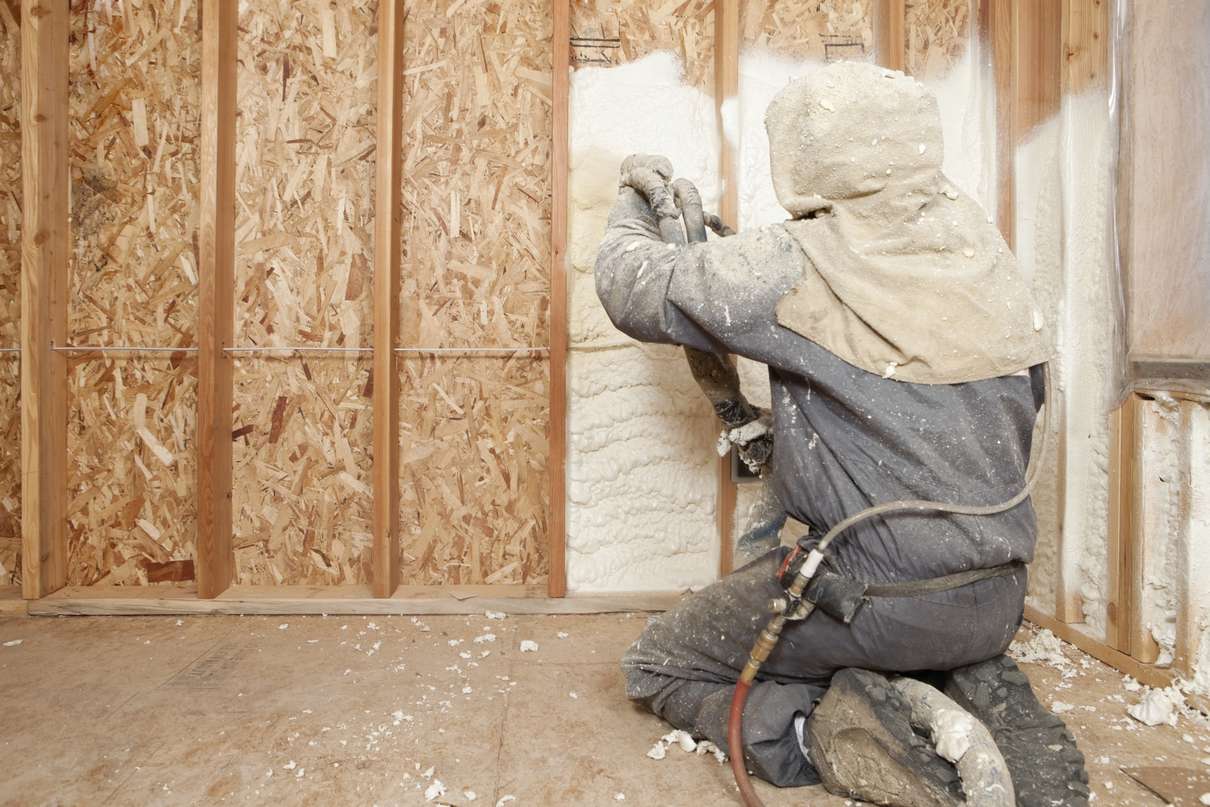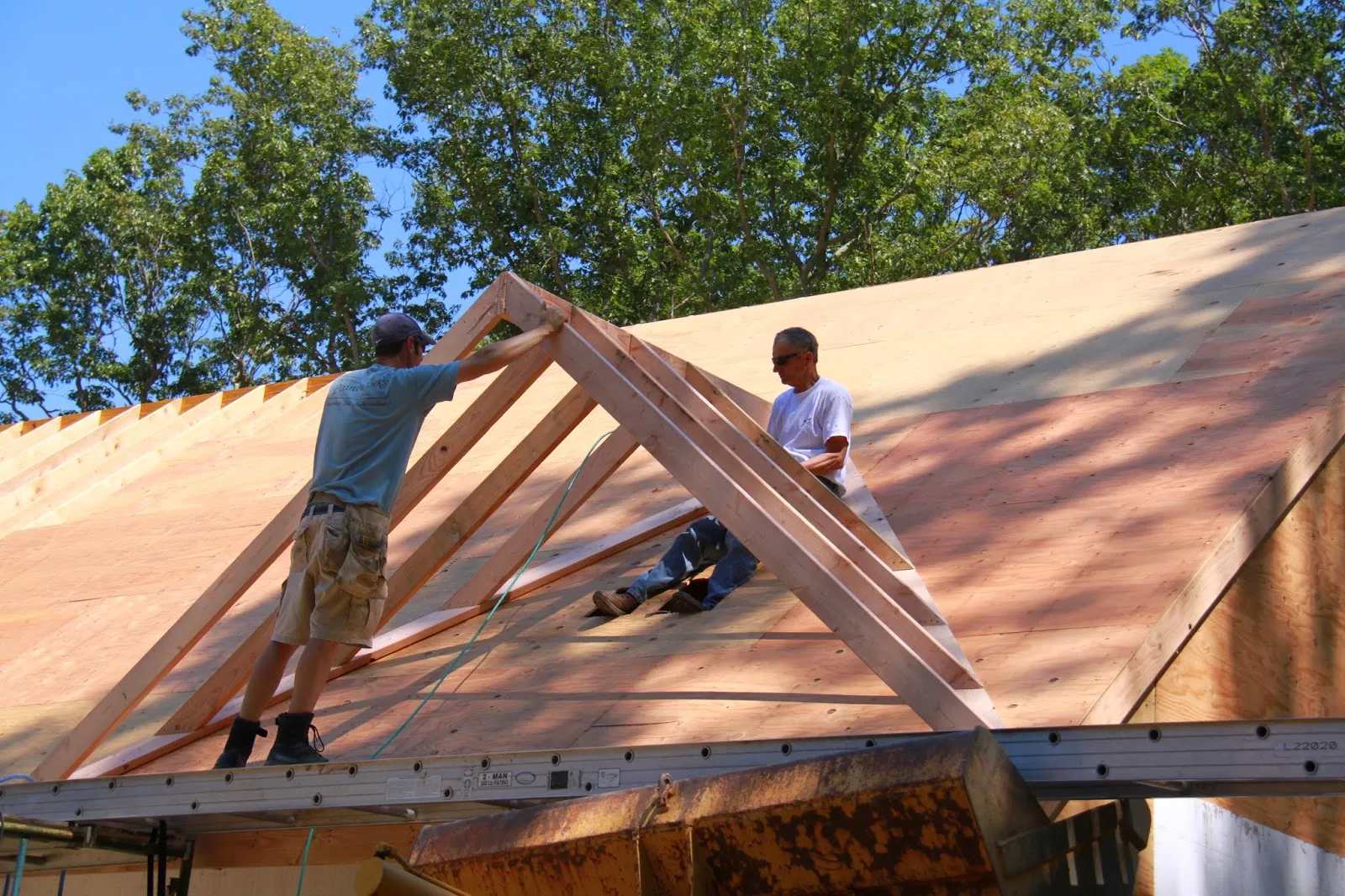Home>diy>Building & Construction>Can You Be Your Own Contractor When Building A House


Building & Construction
Can You Be Your Own Contractor When Building A House
Modified: October 18, 2024
Discover if you can take on the role of contractor in building your own house and save on costs. Learn the ins and outs of building construction and embark on your DIY journey.
(Many of the links in this article redirect to a specific reviewed product. Your purchase of these products through affiliate links helps to generate commission for Storables.com, at no extra cost. Learn more)
Introduction
Building your own house is an exciting and fulfilling endeavor. It allows you the freedom to design your dream home exactly as you envision it. But when it comes to the construction process, many people wonder if they can save money by assuming the role of a contractor themselves. While being your own contractor can have its benefits, it also comes with certain challenges and responsibilities. In this article, we will explore the pros and cons of being your own contractor in building a house and discuss the skills, legal requirements, and considerations involved.
Key Takeaways:
- Being your own contractor when building a house offers cost savings, control over the project, and a valuable learning experience. However, it requires careful consideration of time commitment, skills, and legal requirements.
- Whether you choose to be your own contractor or hire a professional, thorough planning, open communication, and proactive problem-solving are essential for a successful construction project. Prioritize safety, budgeting, and managing subcontractors for a smooth build.
Pros of Being Your Own Contractor
Assuming the role of a contractor when building your own house can offer several advantages:
- Cost Savings: One of the biggest advantages of being your own contractor is the potential cost savings. By cutting out the middleman, you can avoid paying contractor fees and markups on materials and subcontractor services.
- Control over the Project: Being your own contractor gives you complete control over the construction process. You can personally oversee every aspect of the project and ensure that it aligns with your vision and expectations.
- Flexibility and Customization: When you act as your own contractor, you have the flexibility to make changes and adjustments to the design and construction plans during the course of the project. This allows for more customization and the ability to adapt to any unforeseen challenges or opportunities that may arise.
- Learning Experience: Building your own house as a contractor can be a valuable learning experience. You will gain knowledge and expertise in construction management, project coordination, and problem-solving, which can be useful for future projects or renovations.
- Direct Communication with Suppliers and Subcontractors: Assuming the role of a contractor allows you to have direct communication with suppliers and subcontractors. This direct interaction can help establish better relationships and ensure that you receive quality materials and services at competitive prices.
While these advantages are enticing, it is important to carefully consider the potential drawbacks before deciding to be your own contractor. Being aware of the challenges and responsibilities involved will help you make an informed decision and ensure a successful construction process.
Cons of Being Your Own Contractor
While being your own contractor can offer certain advantages, it also comes with its fair share of challenges:
- Time Commitment: Acting as your own contractor requires a significant time commitment. You will need to dedicate yourself to managing the construction process, which can be time-consuming and may interfere with other responsibilities or commitments you have.
- Lack of Experience: Unless you have prior experience in the construction industry, being your own contractor can be daunting. A lack of knowledge and experience in areas such as project management, construction codes, and regulations can lead to mistakes and delays.
- Coordination and Organization: Managing a construction project involves coordinating multiple tasks and subcontractors. Without proper organizational and coordination skills, it can be challenging to keep the project on track and ensure that all parties involved are working efficiently.
- Legal Requirements and Permits: Being your own contractor means taking on the responsibility of complying with legal requirements and obtaining the necessary permits. Understanding building codes, obtaining permits, and scheduling inspections can be complex and time-consuming.
- Stress and Overwhelm: Acting as your own contractor can be highly stressful. Dealing with unexpected issues, budget constraints, and the pressure of managing the construction process can lead to feelings of overwhelm and frustration.
- Risk and Liability: As a contractor, you assume the risk and liability for the construction project. If anything goes wrong or there are quality issues, it falls on you to resolve them and may result in additional costs or legal consequences.
Understanding these potential challenges and evaluating your own skills and capabilities is crucial before deciding to be your own contractor. It is important to weigh the pros and cons carefully and consider if you have the time, expertise, and resources to take on this role successfully.
Understanding the Role of a Contractor
Before you decide to take on the role of a contractor when building your own house, it’s important to have a clear understanding of what this role entails. A contractor is responsible for overseeing and managing the construction project from start to finish, ensuring that it is completed within the specified budget and timeline while meeting quality standards.
Some key responsibilities of a contractor include:
- Project Planning and Management: Contractors are responsible for developing a comprehensive construction plan and timeline. This involves coordinating various tasks, setting deadlines, and ensuring that the project progresses smoothly.
- Subcontractor Coordination: Contractors must hire and manage subcontractors, such as electricians, plumbers, and carpenters, to execute specific aspects of the project. They are responsible for scheduling and overseeing the subcontractors’ work and ensuring that it aligns with the overall construction plan.
- Procurement of Materials and Equipment: Contractors are in charge of procuring and managing the necessary materials and equipment for the construction project. This includes sourcing suppliers, negotiating prices, and ensuring timely delivery of materials.
- Budgeting and Cost Control: Contractors must develop a detailed budget for the construction project and monitor expenses to ensure they stay within the allocated budget. This involves tracking costs, approving invoices, and making adjustments as needed.
- Quality Control: Contractors are responsible for ensuring that all work meets the required quality standards and specifications. This involves conducting inspections, addressing any deficiencies, and ensuring compliance with building codes and regulations.
- Communication and Documentation: Contractors must maintain clear and open communication with all stakeholders involved in the project, including clients, subcontractors, and suppliers. They are also responsible for keeping accurate records, such as contracts, permits, and invoices.
Understanding the role of a contractor and the responsibilities involved is crucial when considering whether to assume this role yourself. Evaluate your ability to handle these tasks effectively and consider seeking assistance or hiring professionals for specific aspects of the project if needed.
Skills and Experience Required
Being a successful contractor requires a combination of various skills and experiences. While you don’t necessarily need to have experience in every aspect of construction, having a solid foundation in certain areas is essential. Here are some key skills and experiences required to be an effective contractor:
- Construction Knowledge: Having a strong understanding of construction processes, techniques, and best practices is essential. You should be familiar with different trades and be able to interpret architectural and engineering drawings to ensure proper execution of the project.
- Project Management: Good project management skills, including planning, organization, and coordination, are crucial. You should be able to create a detailed project plan, schedule tasks, manage resources, and oversee multiple subcontractors to ensure the project progresses smoothly.
- Communication: Strong communication skills are vital as you will be interacting with clients, subcontractors, suppliers, and other stakeholders. You should be able to clearly articulate your expectations, listen effectively, and resolve conflicts or issues that may arise during the construction process.
- Financial Management: Managing the project budget, tracking expenses, and negotiating contracts with suppliers and subcontractors require financial acumen. You should have a solid understanding of construction costs, be able to estimate accurately, and manage cash flow effectively.
- Problem-Solving: Being able to anticipate and solve problems that may arise during the construction process is crucial. This requires the ability to think critically, make quick decisions, and adapt to unexpected challenges or changes in the project scope.
- Attention to Detail: A keen eye for detail is important to ensure that the construction meets quality standards and specifications. You should be able to perform thorough inspections, identify potential issues, and address them promptly.
- Leadership: As a contractor, you will be responsible for managing a team of subcontractors and ensuring that they work cohesively towards the project goals. Strong leadership skills, including motivating, guiding, and resolving conflicts, are essential.
While having prior experience in the construction industry is beneficial, it is not always a requirement. However, if you are new to construction and lack experience, it is advisable to consult with industry professionals or consider hiring a construction consultant to guide you through the process.
Remember that being a contractor requires continuous learning and staying up to date with industry trends and regulations. You may need to invest time in improving and expanding your skills to ensure successful project management and construction execution.
Legal and Licensing Requirements
When acting as your own contractor, it is important to understand and comply with the legal and licensing requirements in your area. These requirements vary depending on the jurisdiction, so it is crucial to research and familiarize yourself with the specific regulations in your region. Here are some common legal and licensing considerations to keep in mind:
- Contractor License: Many jurisdictions require contractors to obtain a license to legally operate. This license typically demonstrates that you have met certain criteria, such as having the necessary experience, passing an exam, or meeting specific financial requirements. Check with your local licensing board or building department to determine if you need a contractor license.
- Building Permits: Before you start construction, you will need to obtain the necessary building permits. These permits ensure that your project complies with local building codes and regulations. Failure to obtain permits can result in fines, delays, or even having to redo work that does not meet code requirements.
- Insurance Coverage: It is essential to have proper insurance coverage when acting as your own contractor. This may include liability insurance, which protects you in case of accidents or injuries on the construction site, as well as builder’s risk insurance, which covers damage to the building during construction.
- Subcontractor Requirements: Depending on local regulations, you may be required to use licensed and insured subcontractors for certain trades, such as electrical or plumbing. Ensure that any subcontractors you hire meet these requirements to avoid potential legal issues.
- Workers’ Compensation: If you hire employees to work on the construction project, you may be required to provide workers’ compensation insurance. This insurance covers medical expenses and lost wages in case of workplace injuries or illnesses.
- Contractual Agreements: It is important to have clear and legally binding contractual agreements with subcontractors, suppliers, and any other parties involved in the construction process. These agreements should outline the scope of work, payment terms, and any warranties or guarantees.
Failure to comply with legal and licensing requirements can lead to legal complications, fines, or delays in the construction process. It is advisable to consult with a legal professional or construction industry expert who can provide guidance on the specific requirements in your area.
Remember that regulations and requirements may change over time, so it is crucial to stay updated on any updates or amendments that may affect your construction project.
Managing the Construction Process
When you take on the role of a contractor for your own house construction, effectively managing the construction process is key to ensure a successful and smooth project. Here are some essential steps to help you manage the construction process effectively:
- Develop a Detailed Project Plan: Start by creating a comprehensive project plan that outlines the scope of work, timeline, and budget. This plan should include the sequencing of tasks, deadlines, and the involvement of subcontractors.
- Coordinate with Subcontractors: As the contractor, you will need to hire and coordinate subcontractors for various aspects of the project, such as plumbing, electrical work, and carpentry. Ensure clear communication and coordination to avoid delays and conflicts.
- Regularly Monitor Progress: Regularly visit the construction site and monitor the progress of the work. This includes ensuring that subcontractors are meeting deadlines, work is being done according to specifications, and quality standards are being upheld.
- Manage Changes and Adjustments: Construction projects often require adjustments or changes along the way. Be prepared to handle these changes, assess their impact on the budget and timeline, and communicate any necessary adjustments to subcontractors and suppliers.
- Handle Procurement and Material Management: Take charge of procuring and managing the necessary materials and equipment for the construction project. This includes sourcing suppliers, negotiating prices, and ensuring timely delivery of materials to avoid delays in the construction process.
- Maintain Documentation: Keep thorough documentation of all aspects of the construction process, including contracts, permits, invoices, and any communication with subcontractors or suppliers. This documentation is crucial for record-keeping, dispute resolution, and potential legal requirements.
- Ensure Compliance with Building Codes: Familiarize yourself with local building codes and regulations and ensure that all work meets these requirements. This includes scheduling and coordinating necessary inspections and addressing any issues or deficiencies identified during these inspections.
- Manage Risk and Safety: Mitigate risks by implementing proper safety protocols and ensuring a safe working environment. This involves providing appropriate safety equipment, enforcing safety procedures, and addressing any safety concerns promptly.
- Communicate and Collaborate: Establish clear and frequent communication with all stakeholders involved in the construction process, including subcontractors, suppliers, and inspectors. Regularly update them on the progress of the project and address any concerns or issues that arise.
- Stay Organized and Flexible: Effective project management requires staying organized and adaptable. Keep track of project-related documents, maintain a schedule, and be prepared to adjust plans or make decisions as needed to keep the construction process on track.
By following these steps and actively managing the construction process, you can ensure that the project stays on schedule, meets quality standards, and is completed successfully.
Budgeting and Cost Control
One of the most critical aspects of managing your own construction project is effective budgeting and cost control. Proper management of finances ensures that the project stays within the allocated budget and helps to avoid any financial setbacks. Here are some essential steps to help you budget and control costs during the construction process:
- Estimate Costs: Begin by thoroughly estimating the costs involved in your construction project, including materials, labor, equipment, permits, and any additional expenses such as inspections or consultations. Research current market prices and consult with professionals to get accurate estimates.
- Create a Detailed Budget: Develop a comprehensive budget that outlines the anticipated costs for each aspect of the project. Allocate funds for materials, subcontractors, permits, equipment rentals, and unforeseen expenses.
- Track Expenditures: Keep a detailed record of all expenses related to the project. Regularly update your budget with actual costs incurred, comparing them to the estimated costs. This allows you to identify any deviations and take necessary action to control expenses.
- Obtain Multiple Quotes: When sourcing materials and services, obtain multiple quotes from suppliers and subcontractors. This allows you to compare prices and choose the most cost-effective options without compromising quality.
- Negotiate Pricing: Explore opportunities to negotiate pricing with suppliers and subcontractors. By negotiating the best possible deals, you can lower costs without compromising the project’s quality.
- Avoid Scope Creep: Scope creep refers to the expansion of project scope beyond the initial plan. It can result in added costs and delays. Clearly define the project scope and communicate any changes or additional work that may arise to ensure appropriate budget adjustments.
- Manage Cash Flow: Monitor the flow of money throughout the project. Ensure that you have enough funds to cover expenses at each stage of construction. Timely payments to subcontractors and suppliers can help maintain good relationships and possibly negotiate better terms.
- Control Change Orders: Carefully evaluate any change orders or additional work requested during the project. Analyze the impact on the budget and carefully consider whether they are necessary or can be managed within the existing budget.
- Regularly Review and Adjust: Review the budget regularly and assess whether adjustments are needed. Take into account any unforeseen circumstances, such as price fluctuations or unexpected issues, and make necessary budget modifications.
- Consider Contingency: Include a contingency fund within your budget to account for unexpected costs or changes. Having a reserve amount available can provide a buffer and help you manage any unforeseen expenses.
By implementing these budgeting and cost control strategies, you can effectively manage your construction project’s finances, optimize your budget, and ensure that the project remains financially viable and successful.
It is possible to be your own contractor when building a house, but it requires a deep understanding of the construction process, local building codes, and the ability to manage multiple subcontractors. It’s important to carefully consider the time, effort, and potential cost savings before taking on this role.
Hiring and Managing Subcontractors
When taking on the role of a contractor for your own house construction, hiring and managing subcontractors is a crucial aspect of the project. Subcontractors play a vital role in executing specialized tasks, such as plumbing, electrical work, and carpentry. Here are some key steps to effectively hire and manage subcontractors:
- Identify the Scope of Work: Determine the specific tasks that need to be subcontracted. Clearly define the scope of work and communicate your expectations to potential subcontractors.
- Research and Vet Subcontractors: Conduct thorough research to identify reputable subcontractors with experience in your specific project requirements. Seek recommendations, review portfolios, and check references to ensure their reliability and expertise.
- Solicit Multiple Bids: Obtain bids from several subcontractors for the same scope of work. This allows you to compare prices, services, and timelines to make an informed decision.
- Evaluate Experience and Credentials: Assess the subcontractors’ experience, licenses, certifications, and insurance coverage. Ensure they have the necessary qualifications and adhere to local regulations.
- Sign Clear and Detailed Contracts: Develop legally binding contracts that clearly outline the scope of work, project timeline, payment terms, and any warranties or guarantees. Address any concerns or requirements upfront to avoid misunderstandings.
- Provide Clear Instructions: Communicate and provide detailed instructions to subcontractors to ensure they understand your expectations and project requirements. Regularly communicate any changes or updates that may arise during the construction process.
- Establish a Schedule: Set a timeline for subcontractors to complete their work and coordinate their schedules to avoid conflicts or delays. Regularly review progress and address any issues to ensure adherence to the construction schedule.
- Maintain Open Communication: Foster open and clear communication with subcontractors. Establish a rapport, address any concerns promptly, and maintain consistent communication channels to ensure effective collaboration.
- Regularly Monitor Work Quality: Regularly inspect the work completed by subcontractors to ensure it meets the required quality standards and specifications. Address any deficiencies or concerns immediately to avoid rework or delays.
- Process Payments Promptly: Follow the agreed-upon payment schedule and process subcontractor payments promptly. This helps maintain good relationships and encourages timely completion of work.
- Manage Disputes and Changes: Address any disputes or changes that may arise during the project. Communicate openly, negotiate solutions, and document any changes or modifications to the original contracts.
By following these steps, you can effectively hire and manage subcontractors, ensuring that the work is completed to the desired standards and within the project timeline. Building strong relationships with subcontractors contributes to the success of the overall construction process.
Procuring Materials and Equipment
When acting as your own contractor for a construction project, procuring the necessary materials and equipment is a critical task to ensure a smooth and successful build. Here are some essential steps to help you effectively procure materials and equipment:
- Create a Comprehensive List: Begin by creating a detailed list of all the materials and equipment you will need for the project. Break down the list by trade or area of work to ensure nothing is overlooked.
- Research Suppliers: Conduct thorough research to identify reputable suppliers in your area. Consider factors such as pricing, quality of products, delivery options, and customer reviews to make informed decisions.
- Obtain Multiple Quotes: Obtain multiple quotes from different suppliers for the same materials or equipment. This allows you to compare prices, evaluate the quality of products, and negotiate better deals.
- Consider Quality and Durability: Prioritize the quality and durability of materials and equipment. Making informed decisions based on the lifespan, performance, and suitability of the products can help save costs in the long run.
- Coordinate Deliveries: Maintain a well-organized delivery schedule to ensure materials and equipment arrive at the construction site when needed. Coordinate with suppliers to schedule deliveries in accordance with the project timeline.
- Negotiate Terms: Negotiate pricing, discounts, payment terms, and delivery options with suppliers. Building a good relationship with suppliers may allow you to secure better deals, particularly when purchasing materials in bulk.
- Monitor Inventory: Regularly monitor and track the inventory of materials and equipment on-site. This helps prevent delays or disruptions caused by insufficient supplies and allows for timely reordering.
- Inspect Deliveries: Thoroughly inspect all deliveries upon arrival to ensure that the materials and equipment are in good condition and meet the required specifications. Address any discrepancies or damages with the supplier immediately.
- Manage Waste and Surplus: Minimize waste by accurately estimating the required quantities of materials. Properly manage any surplus materials to avoid unnecessary expenses and clutter on the construction site.
- Consider Sustainable Options: Explore environmentally-friendly and sustainable material options. Choosing eco-conscious materials can reduce the project’s environmental impact and may even qualify for certain certifications or incentives.
- Maintain Documentation and Records: Keep thorough records of all procurement-related transactions, including invoices, receipts, warranties, and any communication with suppliers. This documentation is crucial for accounting purposes and potential warranty claims.
By following these steps, you can effectively procure the necessary materials and equipment for your construction project. Careful planning, research, and communication with suppliers will help ensure that you have the right resources at the right time, contributing to the successful completion of your project.
Ensuring Proper Permits and Inspections
Obtaining the necessary permits and undergoing inspections are essential steps in the construction process. Adhering to local building regulations ensures that your construction project meets safety standards and building codes. Here are some key considerations to ensure proper permits and inspections:
- Research Local Regulations: Familiarize yourself with the building codes and regulations specific to your area. Different jurisdictions may have varying requirements, so it is crucial to understand and comply with the rules.
- Determine Permit Requirements: Identify the specific permits required for your construction project, such as building permits, electrical permits, plumbing permits, and mechanical permits. Consult with your local building department to ensure you have a comprehensive understanding of the necessary permits.
- Complete Permit Applications: Fill out permit applications accurately and provide all necessary documentation, including construction plans, engineer/architect drawings, and any other required information. Ensure that applications are submitted well in advance of the desired start date to allow for processing time.
- Pay Permit Fees: Most permits require payment of fees. Calculate the appropriate fees based on the scope of work and ensure timely payment to avoid delays in the permit approval process.
- Obtain Approval and Display Permits: Once your permit applications are approved, ensure that the permits are prominently displayed at the construction site as required by local regulations. This allows for easy verification by inspectors and authorities.
- Schedule Inspections: Coordinate with the appropriate regulatory authorities to schedule inspections at critical stages of the construction process, such as foundation, framing, electrical, plumbing, and final inspections. Ensure that the project is ready and meets the necessary requirements for each inspection.
- Prepare for Inspections: Thoroughly review the building plans and specifications before inspections to ensure compliance. Address any code violations or discrepancies identified during inspections promptly and collaborate with the inspectors to rectify them.
- Document Inspections and Approvals: Keep detailed records of each inspection, including the date, inspector’s name, and outcome. This documentation provides proof of compliance and may be necessary for future reference or potential legal requirements.
- Address Violations or Deficiencies: If any code violations or deficiencies are identified during inspections, promptly address them and schedule re-inspections to ensure compliance. Take corrective measures to rectify any issues and obtain approval before proceeding with subsequent construction stages.
- Finalize Inspections and Obtain Certificates of Occupancy: Once all inspections are successfully completed, and the construction meets the required standards, apply for a Certificate of Occupancy or any other necessary certifications. This certificate confirms that the building is safe and compliant, allowing you to occupy and use the space.
Ensuring proper permits and inspections is crucial for both legal compliance and safety. By adhering to local regulations, obtaining the necessary permits, and diligently undergoing inspections, you can ensure that your construction project meets the required standards and regulations.
Dealing with Delays and Unexpected Issues
Construction projects are often subject to delays and unexpected issues that can arise throughout the process. It’s important to be well-prepared and proactive in handling these challenges to ensure the smooth progression of your project. Here are some key steps to deal with delays and unexpected issues:
- Identify Potential Risks: Conduct a thorough risk assessment at the beginning of the project to identify potential delays or issues that may arise. Consider factors such as weather conditions, material availability, subcontractor schedules, and unforeseen site conditions.
- Develop Contingency Plans: Create contingency plans to address common risks and potential delays. This may include having backup suppliers, establishing alternative work schedules, or budgeting for unexpected expenses.
- Maintain Open Communication: Regularly communicate with subcontractors, suppliers, and other stakeholders to stay informed about any potential issues or delays. Promptly address any concerns and collaborate on finding solutions to minimize the impact on the project timeline.
- Document Changes and Delays: Keep thorough documentation of any changes, delays, or unexpected issues that occur. Document the reasons, impact on the project timeline, and any resulting costs. This documentation may be valuable for insurance claims, project evaluations, or dispute resolution.
- Modify the Project Schedule: If delays occur, review and revise the project schedule accordingly. Consider adjusting timelines, resource allocations, or subcontractor schedules to accommodate unforeseen delays. Communicate the revised schedule to all relevant parties to ensure everyone is aware of the changes.
- Take Swift Action: Address delays and unexpected issues as soon as they arise. Promptly assess the situation, determine the cause of the delay, and develop a plan of action to mitigate its impact. Engage the necessary resources and communicate with stakeholders to minimize disruptions.
- Collaborate with Subcontractors: Engage in open and collaborative problem-solving with subcontractors. Together, identify viable solutions and approaches to overcome delays or unexpected issues. Regularly communicate with subcontractors to ensure everyone is aligned and working towards resolving the problem.
- Monitor and Adjust: Continually monitor the progress of the project and adjust the schedule and resources as necessary. Regularly review the impact of delays and unexpected issues on the overall timeline and make proactive decisions to keep the project on track.
- Adjust Expectations: Acknowledge that delays and unexpected issues are a common part of the construction process. Adjust expectations accordingly and communicate any necessary adjustments to clients, stakeholders, or other relevant parties. Transparently address any concerns and manage expectations throughout the project.
- Evaluate and Learn: Conduct a post-project evaluation to assess the causes and impact of delays and unexpected issues. Identify areas for improvement and implement lessons learned in future projects to minimize the occurrence and impact of similar challenges.
By following these steps and adopting a proactive and flexible approach, you can effectively manage delays and unexpected issues in your construction project. This proactive mindset will help you navigate challenges and maintain the momentum towards completing your project successfully.
Safety and Insurance Considerations
Ensuring the safety of workers and property during a construction project is of utmost importance. Additionally, having the right insurance coverage provides financial protection in the event of accidents or unforeseen incidents. Here are some key safety and insurance considerations to keep in mind:
- Implement Safety Protocols: Establish comprehensive safety protocols and procedures to protect workers, subcontractors, and visitors on the construction site. This includes providing proper safety training, enforcing the use of personal protective equipment (PPE), and conducting regular safety inspections.
- Comply with Regulations: Familiarize yourself with local safety regulations and ensure compliance with all applicable laws and standards. This includes following building codes, safety guidelines, and regulations established by relevant authorities.
- Site Security: Implement measures to secure the construction site and equipment to prevent theft, unauthorized access, or vandalism. This includes using fencing, security cameras, and proper site lighting.
- Worker’s Compensation: Obtain worker’s compensation insurance to provide coverage for injuries or illnesses sustained by workers on the construction site. This insurance ensures that workers are financially protected and medical expenses are covered in the event of work-related accidents.
- General Liability Insurance: Obtain general liability insurance to protect against claims for property damage or bodily injury resulting from construction activities. This insurance covers legal costs and settlements if a third party sues for damages related to the construction project.
- Builder’s Risk Insurance: Consider obtaining builder’s risk insurance, also known as construction insurance, to provide coverage for damages to the building under construction. This insurance covers risks such as fires, storms, theft, and vandalism during the construction process.
- Subcontractor Insurance: Ensure that subcontractors have proper insurance coverage, including liability insurance and worker’s compensation insurance. Request and confirm certificates of insurance from subcontractors before they start work on the project.
- Regular Inspections: Conduct regular inspections of the construction site to identify and address potential safety hazards. Address any issues promptly to prevent accidents or injuries. Document these inspections and take appropriate corrective actions.
- Emergency Preparedness: Develop and communicate an emergency response plan that outlines procedures for dealing with accidents, fires, severe weather, or other unexpected incidents. Ensure that appropriate safety equipment, such as fire extinguishers, first aid kits, and emergency exits, are readily available on-site.
- Contractor’s Protective Liability Insurance: Consider obtaining Contractor’s Protective Liability Insurance (CPL) to protect against claims arising from the subcontractor’s negligence. CPL provides additional coverage in the event that a subcontractor does not have adequate insurance.
Prioritizing safety and having the right insurance coverage not only protects workers and property but also provides peace of mind throughout the construction project. Consult with insurance professionals to understand the specific insurance requirements and obtain policies that suit the needs of your project.
Time Commitment and Stress
Undertaking the role of a contractor for your own construction project requires a significant time commitment and can be accompanied by high levels of stress. It’s important to be aware of the demands and potential challenges in order to manage your time effectively and mitigate stress. Here are some considerations regarding time commitment and stress:
- Project Coordination: Acting as the contractor entails overseeing various tasks, managing subcontractors, and ensuring that the project progresses smoothly. This requires careful coordination and frequent communication with different parties involved, which demands a substantial time commitment.
- Construction Supervision: Being responsible for the construction process means being present on-site to monitor the work, address any issues, and ensure compliance with project specifications. This can require a significant amount of time and presence at the construction site.
- Decision-Making: As the contractor, you will be responsible for making decisions related to the project. This includes evaluating and approving designs, materials, and subcontractor quotes. The decision-making process can be time-consuming and may require thorough research and consideration.
- Administrative Tasks: Managing a construction project involves handling administrative tasks such as managing budgets, organizing permits and inspections, coordinating schedules, and maintaining documentation. These responsibilities can add to the time commitment required for the project.
- Unforeseen Delays: Construction projects are susceptible to unforeseen delays and challenges, such as weather conditions, material shortages, or unexpected site conditions. Dealing with such delays can result in additional time requirements and increase overall stress levels.
- Budget Constraints: Managing the project’s budget can be a source of stress. Striking a balance between ensuring quality and adhering to budgetary constraints can be challenging, requiring careful financial management and decision-making.
- Work-Life Balance: The time commitment and stress associated with acting as a contractor can impact your work-life balance. Balancing personal commitments, work responsibilities, and the demands of the construction project may require effective time management and prioritization.
- Delegation and Support: Delegating certain tasks to trusted professionals or seeking support from knowledgeable individuals, such as construction consultants or project managers, can help alleviate the time commitment and stress associated with managing the project on your own.
- Self-Care and Stress Management: Practicing self-care and implementing stress management techniques is important to reduce stress levels. This may include prioritizing time for relaxation, engaging in activities outside of the construction project, and seeking support from friends, family, or professionals when needed.
It’s essential to take into account the time commitment and potential stress associated with acting as a contractor. Understanding these factors allows you to develop strategies to effectively manage your time, mitigate stressful situations, and maintain a healthy work-life balance throughout the construction project.
Final Considerations
Before making the decision to be your own contractor in building a house, there are a few final considerations to keep in mind:
- Personal Skills and Experience: Assess your own skills and experience in construction management. Be honest with yourself about your capabilities and consider seeking guidance or assistance from professionals if needed.
- Time and Availability: Consider the time commitment required to act as a contractor and whether you have the availability to oversee the project effectively. Ensure that you can dedicate sufficient time and attention to the construction process.
- Financial Considerations: Evaluate your budget and financial resources. Determine whether assuming the role of a contractor will result in significant cost savings and if you have the funds to cover unexpected expenses or delays.
- Support Network: Assess the availability of support from family, friends, or professionals who can assist you throughout the construction process. Having a reliable support network can help alleviate stress and provide guidance when needed.
- Risk Management: Consider the risks associated with being your own contractor, such as potential legal issues, project delays, or safety concerns. Develop strategies to mitigate these risks and be prepared to handle any unexpected challenges that may arise.
- Consultation and Advice: Seek advice from professionals in the construction industry, including architects, engineers, and construction consultants. Their expertise can provide valuable insights and help navigate potential pitfalls.
- Building Regulations: Ensure that you have a thorough understanding of local building regulations, permits, and codes. Familiarize yourself with the legal requirements and ensure compliance throughout the construction process.
- Realistic Expectations: Set realistic expectations for the construction project. Understand that there may be unforeseen delays, challenges, or changes along the way. Flexibility and adaptability are key to maintaining a positive outlook throughout the process.
- Quality Control: Prioritize quality control to ensure the construction meets the desired standards. Regularly inspect the work, address any deficiencies promptly, and strive for excellence in every aspect of the project.
- Personal Satisfaction: Consider the personal satisfaction and sense of accomplishment that comes from successfully building your own house. Assess whether the rewards outweigh the challenges and if the experience aligns with your personal goals and aspirations.
Taking on the role of a contractor when building a house can be a rewarding experience, offering creative control and potential cost savings. However, it also requires careful consideration, planning, and commitment. Assess your own capabilities, seek advice, and weigh the pros and cons before making a decision. Whether you choose to be your own contractor or decide to hire a professional, the most important aspect is to create a safe, beautiful, and comfortable home that reflects your personal vision.
Conclusion
Building a house is a significant undertaking, and the decision to be your own contractor should not be taken lightly. While assuming this role can offer advantages such as cost savings, control, and customization, it also comes with its fair share of challenges. It requires a deep understanding of the construction process, management skills, and the ability to navigate legal requirements and regulations.
Throughout this article, we have explored the pros and cons of being your own contractor, discussed the skills and experiences required, and highlighted important considerations such as safety, permits, and budgeting. It is crucial to evaluate your own abilities and the resources available to you before deciding whether to take on this role.
If you choose to be your own contractor, it is essential to approach the project with thorough planning, open communication, and proactive problem-solving. Stay organized, seek guidance from professionals when needed, and ensure compliance with local regulations. Building a strong support network and prioritizing your own well-being will help you manage the time commitment and potential stress associated with the role.
On the other hand, if you decide to hire a professional contractor, make sure to carefully research and vet potential candidates, review their portfolio, and communicate your expectations clearly. Collaborating with experienced professionals can provide peace of mind and ensure a smooth construction process.
Ultimately, the choice to be your own contractor or hire a professional depends on your skills, availability, budget, and personal preferences. Remember to assess the risks, consult with experts, and make a decision that aligns with your goals for the construction project.
Whether you choose to take on the role of a contractor or enlist the help of professionals, the most important aspect is to create a safe, functional, and beautiful home that brings joy and satisfaction to you and your family.
Frequently Asked Questions about Can You Be Your Own Contractor When Building A House
Was this page helpful?
At Storables.com, we guarantee accurate and reliable information. Our content, validated by Expert Board Contributors, is crafted following stringent Editorial Policies. We're committed to providing you with well-researched, expert-backed insights for all your informational needs.













0 thoughts on “Can You Be Your Own Contractor When Building A House”